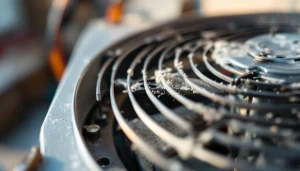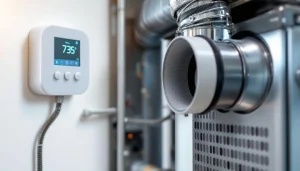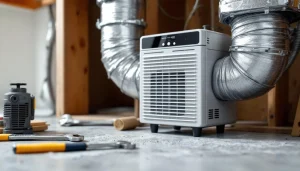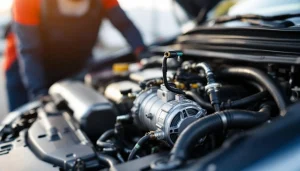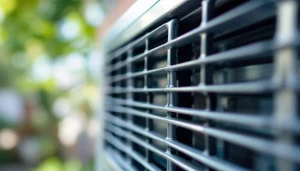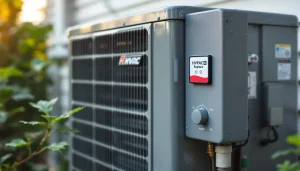At Klein Cooling, we know that understanding the components of your air conditioning system is key to maintaining its efficiency. One crucial element often overlooked is the air conditioning service valve.
These small but mighty components play a vital role in the operation and maintenance of your AC unit. In this post, we’ll explore what service valves are, their functions, and why they’re essential for your cooling system’s performance.
What Are Air Conditioning Service Valves?
Definition and Purpose
Air conditioning service valves are small but essential components in HVAC systems. These valves serve as access points for technicians to perform various maintenance tasks, including refrigerant charging, system diagnostics, and repairs. They play a critical role in the operation and maintenance of AC units, allowing for efficient servicing and system optimization.
Types of Service Valves
Two main types of service valves exist in air conditioning units:
- Schrader Valves: Also known as needle valves, these are similar to those found in car tires. Schrader valves are spring-loaded and self-sealing, which makes them easy to use and less prone to leaks. They’re commonly found in modern AC systems.
- Stem Valves: These valves require a special tool to open and close. Stem valves are more common in older AC systems and industrial applications. They offer a secure seal but can be more challenging to operate.
Location of Service Valves
Service valves are typically located on the outdoor condensing unit of your air conditioning system. You’ll find them on two main pipes:
- Suction Line: This is usually the larger of the two pipes and is insulated. It carries refrigerant vapor from the evaporator to the compressor.
- Liquid Line: This smaller, uninsulated pipe carries liquid refrigerant from the condenser to the expansion device.
Importance for Maintenance
Service valves allow the HVAC system to switch between heating and cooling modes. The primary function of these valves is to reverse the flow of refrigerant, which is essential for the system’s operation.
Safety Considerations
It’s important to note that only trained HVAC professionals should manipulate service valves. Improper handling can lead to refrigerant leaks (which are harmful to the environment) or damage to the AC system. If you suspect issues with your AC unit, it’s always best to contact a reputable HVAC service provider (like Klein Cooling for those in Palm Coast, FL) to ensure safe and proper maintenance.
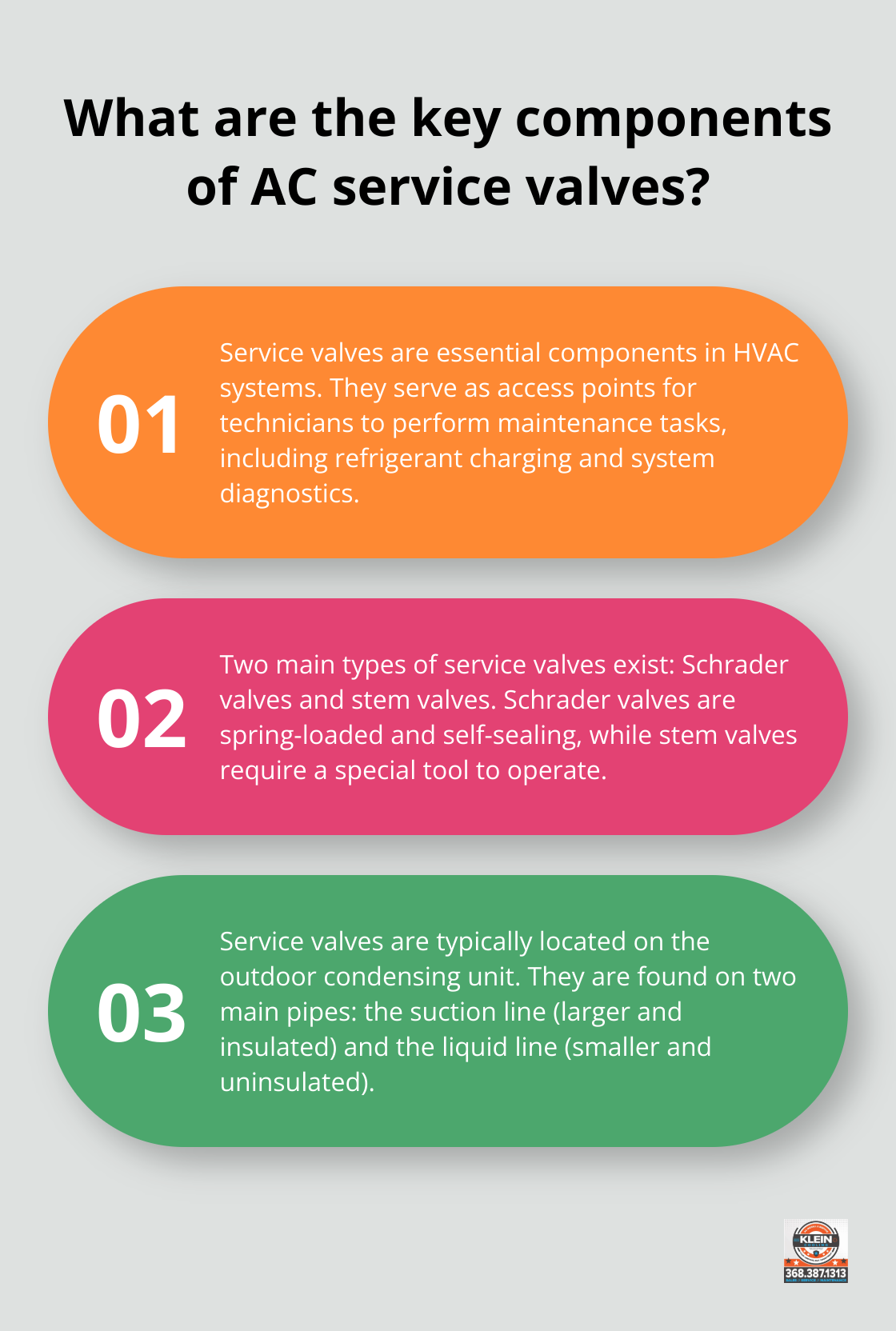
Understanding the role of service valves can help you appreciate the complexity of your AC system and the importance of regular professional maintenance. In the next section, we’ll explore the specific functions and significance of these valves in more detail.
What Do Service Valves Do?
Refrigerant Management
Service valves are essential components in air conditioning systems. They serve as access points for technicians to charge and recover refrigerant. This process maintains the correct pressure and temperature within the system, which directly impacts cooling efficiency.
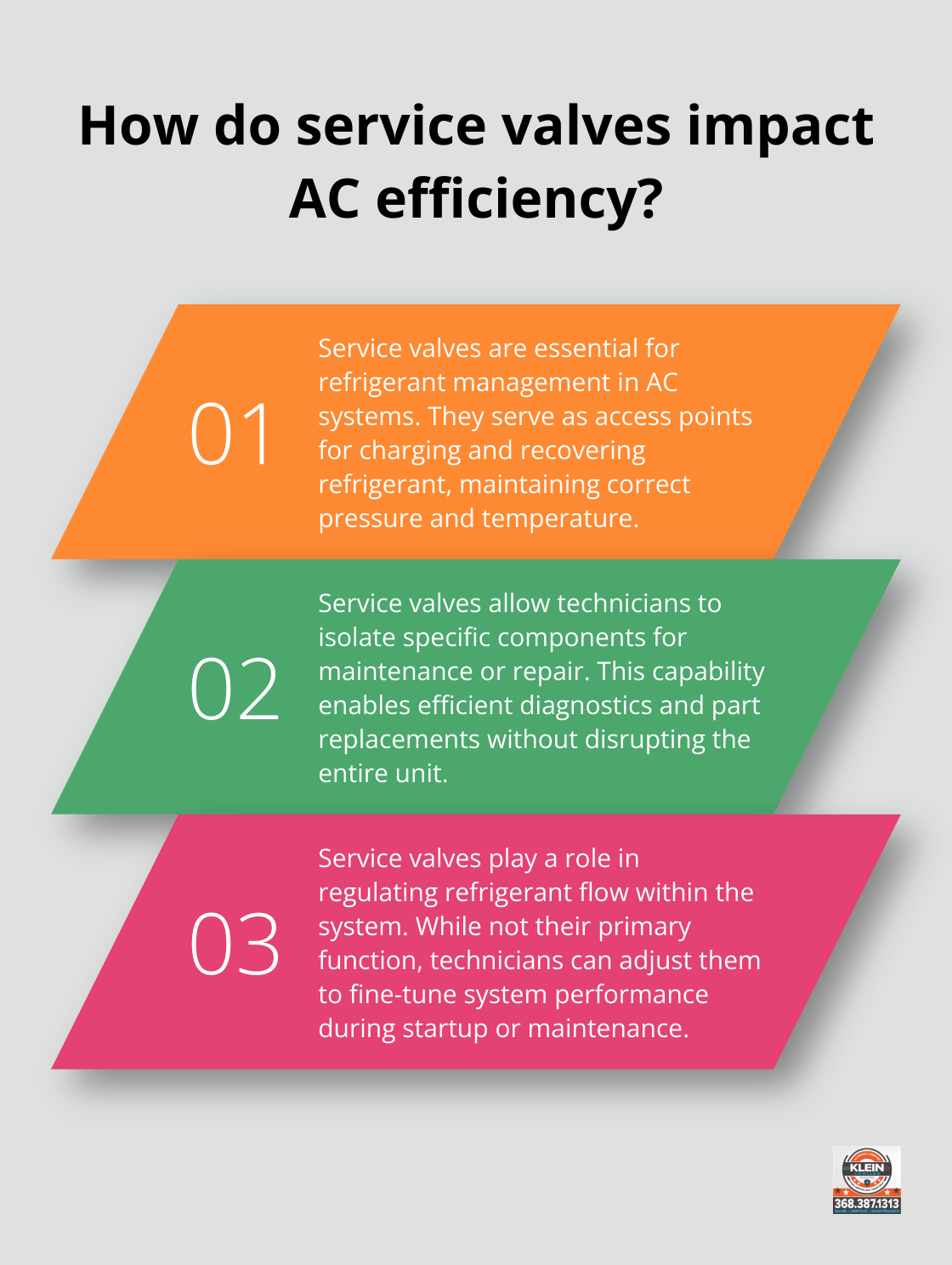
The expansion valve, which sits between the condenser and the evaporator, allows the refrigerant to expand into a gas. This is a crucial part of the refrigeration cycle in air conditioners.
Component Isolation
Service valves allow technicians to isolate specific components of the AC system for maintenance or repair. This capability proves invaluable when diagnosing issues or replacing parts. Technicians can work on specific areas without disrupting the entire unit.
For instance, if a compressor needs replacement, technicians use service valves to isolate it from the rest of the system. This method prevents refrigerant loss and makes the repair process more efficient and environmentally friendly.
Flow Regulation
While not their primary function, service valves play a role in regulating refrigerant flow within the system. When fully open, they allow unrestricted flow. However, technicians can partially close them to adjust the flow rate if necessary.
This feature is particularly useful during system startup or when technicians need to fine-tune the system’s performance. It’s important to note that only trained professionals should perform this adjustment, as incorrect valve settings can lead to system inefficiency or damage.
Environmental Impact
Proper handling of service valves is critical for environmental protection. Improper manipulation can lead to refrigerant leaks, which harm the environment and reduce system efficiency.
Professional Handling
Only trained HVAC professionals should manipulate service valves. Improper handling can lead to refrigerant leaks or damage to the AC system. If you suspect issues with your AC unit, contact a reputable HVAC service provider to ensure safe and proper maintenance.
The importance of service valves extends beyond their basic functions. In the next section, we’ll explore common issues that can affect these critical components and discuss maintenance practices to keep them operating at peak efficiency.
Service Valve Issues and Maintenance
Common Problems with Service Valves
Service valves in air conditioning systems face several issues over time. These problems can affect the efficiency and performance of the entire AC unit.
Leak Detection and Resolution
Refrigerant leaks pose a serious concern for AC systems. They reduce efficiency and harm the environment. The EPA provides information to help homeowners make informed decisions when purchasing, servicing, or disposing of home air conditioners.
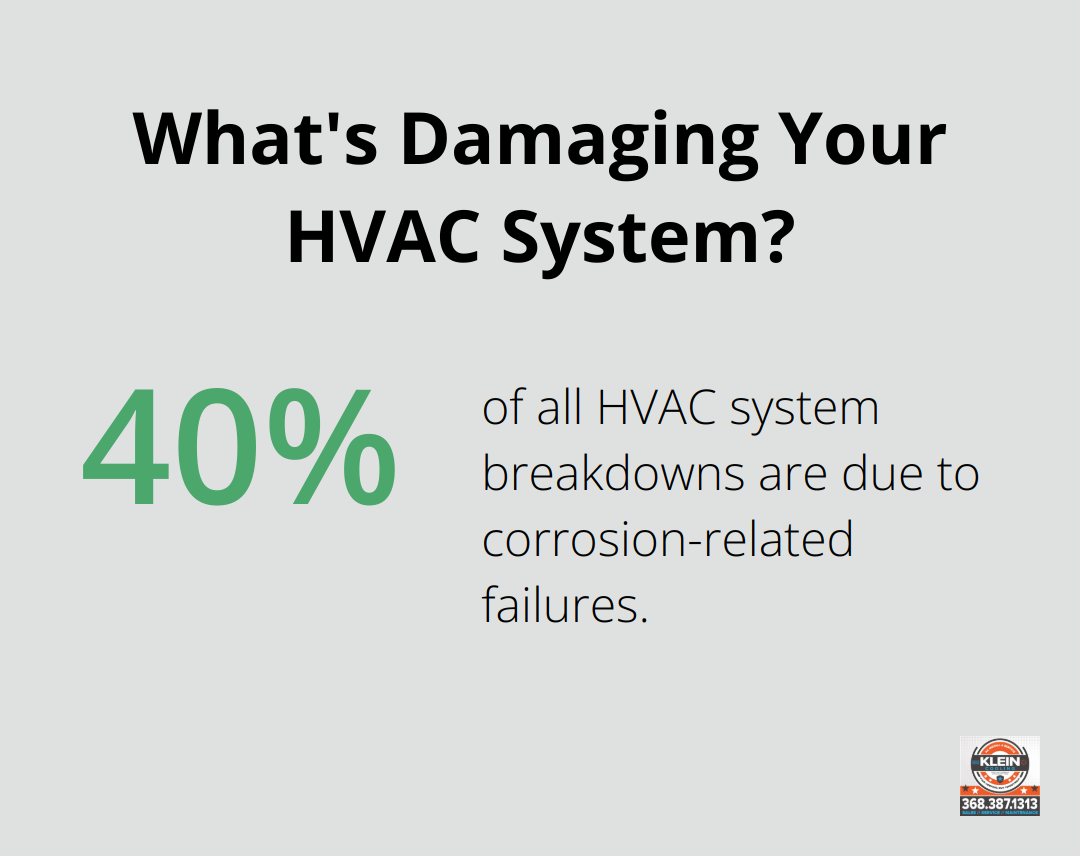
HVAC technicians use electronic leak detectors or UV dye to identify leaks. These tools can locate even small leaks that might otherwise go unnoticed. If your AC doesn’t cool effectively or you hear hissing sounds near the outdoor unit, you should contact a professional.
Corrosion and Its Effects
Corrosion presents another challenge for service valves. It can cause the valve to stick or fail to seal properly. A study by the Air-Conditioning, Heating, and Refrigeration Institute (AHRI) found that corrosion-related failures account for about 40% of all HVAC system breakdowns.
Coastal areas are particularly susceptible due to salt air. Regular inspections can catch corrosion early before it leads to more serious problems.
Proper Maintenance Practices
The Department of Energy recommends annual maintenance for air conditioning systems. During these check-ups, technicians should:
- Inspect valves for signs of wear or damage
- Clean valve stems and caps to prevent debris buildup
- Check for proper operation and sealing
- Replace valve caps if they’re missing or damaged
Regular maintenance prevents issues and can improve system efficiency. The EPA notes that improving energy efficiency in buildings often involves air sealing and other weatherization techniques.
Professional Handling
Only certified professionals should handle refrigerants and adjust service valves. DIY maintenance can help (such as keeping the area around your outdoor unit clean), but leave the technical work to the experts.
In Palm Coast, FL, and nearby areas, Klein Cooling provides comprehensive maintenance plans that include service valve checks. This proactive approach helps customers avoid unexpected breakdowns and costly repairs.
Final Thoughts
Air conditioning service valves play a vital role in the performance and maintenance of cooling systems. These small components allow for efficient servicing, system optimization, and refrigerant management. Regular inspections and maintenance prevent issues like leaks and corrosion, which can lead to costly repairs and reduced system performance.
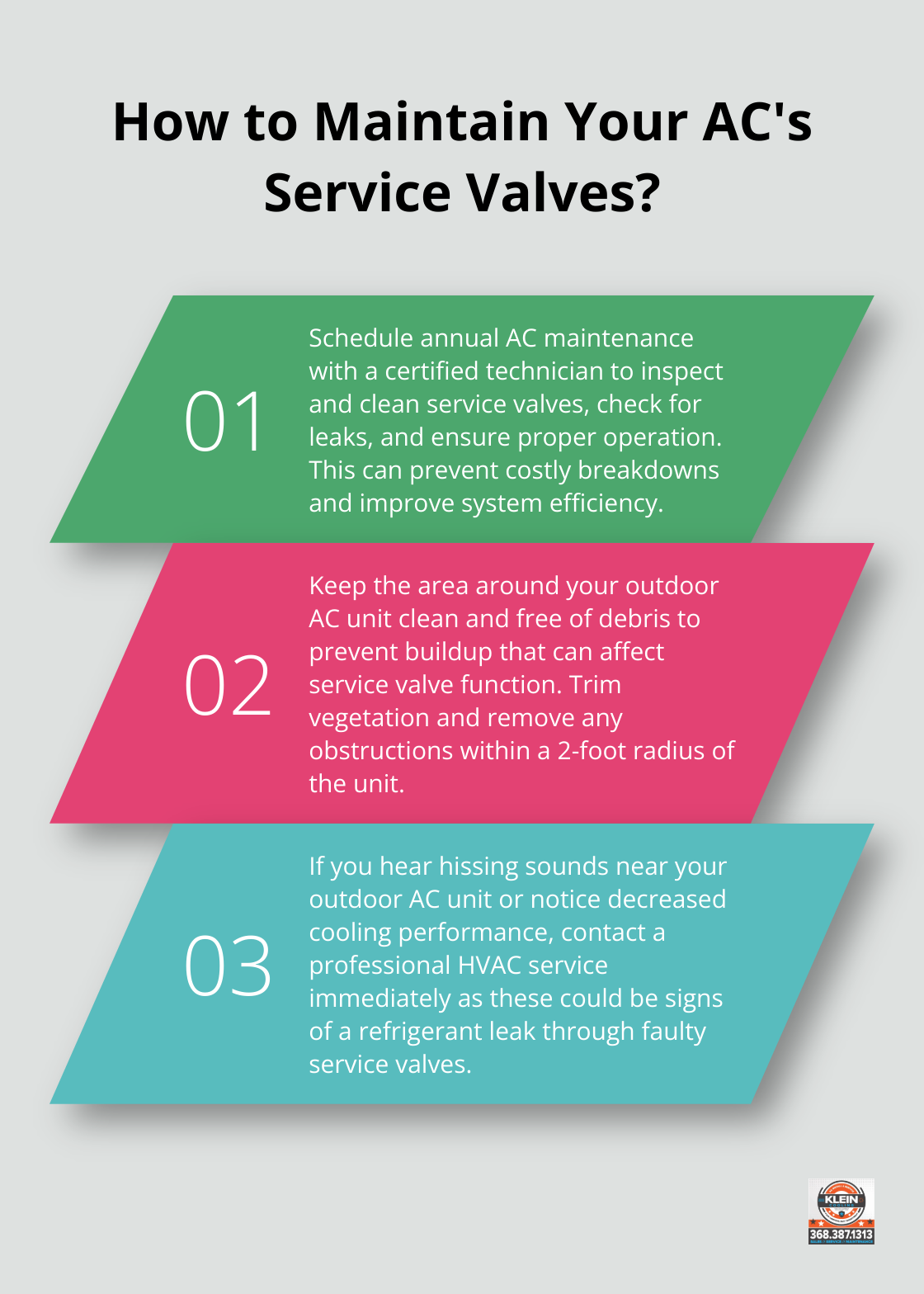
Only certified HVAC technicians should handle these components due to the potential risks associated with refrigerant handling and system adjustments. Proper care of service valves maintains your air conditioner’s efficiency and longevity. Prompt attention to any issues will help keep your system running efficiently, save you money on energy bills, and extend the life of your AC unit.
For homeowners in Palm Coast, FL, and surrounding areas, Klein Cooling offers expert HVAC services (including comprehensive maintenance plans that cover service valve checks). Our team of professionals has the knowledge and tools to keep your air conditioning system running smoothly. Trust Klein Cooling for all your HVAC needs and experience professional, reliable service.

